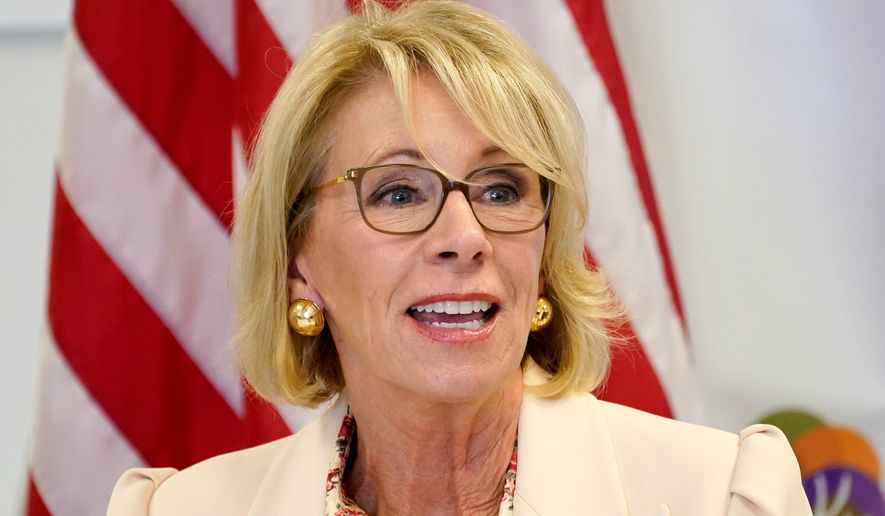For-profit colleges never had a better friend in the Cabinet than outgoing Education Secretary Betsy DeVos. The Michigan Republican fundraiser and investor joined the Trump administration with a history of financing firms that worked with proprietary colleges, and her agency has spent the last four years snipping away regulations the industry found burdensome.
Things are about to change.
But while the mood for for-profit colleges is widely expected to sour under a Biden administration, the contours of the debate over private-sector, post-secondary education have shifted radically since presumptive President-elect Joseph R. Biden was last in office, in part due to COVID-19.
For months, Mr. Biden has talked up publicly-funded, two-year trade and community colleges as an alternative to expensive four-year schooling. The Democrat’s campaign has also frequently invoked Jill Biden, the candidate’s wife and a community college writing professor, as the public face of a campaign to revitalize two-year colleges that Ms. Biden has called the nation’s “best kept secret.”
Two-year schools also traditionally compete for students with for-profit schools, a sector the Biden-Harris ticket has not worked to hide contempt for.
In a comment that took the industry aback, then-vice presidential candidate Sen. Kamala Harris, a former state prosecutor, in a speech at the Democratic national convention equated for-profit colleges with transnational criminal organizations and child sex abusers, remarking, “I know a predator when I see one.”
Speculation has already begun on who Mr. Biden will pick to replace Ms. DeVos, with big-city school superintendents such as Janice Jackson in Chicago or Sonja Santelises in Baltimore said to be in the mix.
Whoever takes the job will replace an agency head who never hid her lack of affection for the department she ran.
In remarks last month to Hillsdale College in Michigan, Ms. DeVos traced the origins of the sprawling, $70 billion bureaucracy of the Education Department to former President Carter, who she said “bent to the demands of big union bosses.”
Under Ms. DeVos, the Education Department repealed the 2014 Obama-era rule on “gainful employment,” which had required higher standards for schools in the for-profit sector to prove their graduates could find jobs. Her agency also overhauled borrower defines rules, with critics saying the friendlier terms for the borrowers would make it difficult for students to receive debt forgiveness.
The changes were cheered by the industry, which began rebounding in enrollment after the Obama years.
Then came the pandemic.
As colleges shuttered campuses across the coast, many first-time students sought out online education for the summer and fall months. New numbers from the National Student Clearinghouse published in October show that for-profit college enrollment is up 3% over last year, while public community college enrollment has dropped 9%.
Such a boom in enrollment, however, now faces the prospect of tightening oversight from whoever Biden picks to lead his education agency, though it won’t be overnight.
“It does take time to regulate,” said Antoinette Flores, director of postsecondary education with the left-leaning Center for American Progress. “During the Obama administration, it took a really long time on gainful employment because they faced lawsuits.”
Ms. Flores also noted the entire industry is “smaller” now following years of falling enrollment and shuttering of colleges, such as Corinthian Colleges and ITT Technical Institute.
“The last time we saw an explosion in for-profit colleges and enrollments was during the last recession,” added Ms. Flores, “and that’s where we saw some of the most egregious abuses.”
While it’s unclear whether Mr. Biden will have a Democratically-friendly U.S. Senate, the former Vice President is expected to reinstate the Obama-era gainful employment rules for career colleges. Congress would also need to agree to eliminate provisions utilized by the for-profit industry around the so-called “90-10 rule,” which tamps down on for-profits from receiving more than 90% of their funding from federally-subsidized student loans.
The for-profit industry is preparing an olive branch to progressive leadership. Later this month, Career Education Colleges and Universities group will host its regular post-election summit with a slate of Democratic-leaning speakers, including a former California congresswoman and education advisor to former Sen. Ted Kennedy.
Progressive boosters of for-profit education often tout the schools’ relatively diverse student bodies. According to a 2017 report from the Education Department, between 22% and 27% of students at for-profits are Black, compared with only 135 to 16% at nonprofit institutions. Military students also make up a higher percentage of students at proprietary schools.
“Career education colleges and universities have delivered access, opportunities, and outcomes in higher education to millions of Americans for decades, through Democrat and Republican Administrations,” Steve Gunderson, CECU’s CEO and president, said in a statement issued on Monday. “This sector will continue to play its important role and perform its job educating students and preparing them for in-demand careers.”
Already, the first battle over for-profits may have shaped up for the next administration. The morning after Election Day, Education Department officials announced a persistently troubled accreditation group — the Accrediting Council for Independent Colleges and Schools — lacked adequate staff to complete reviews of colleges.
Ms. DeVos opened an investigation into ACICS following a report by USA Today that one of the schools accredited by the group, Reagan National University, lacked students and faculty. Ms. DeVos had restored the accreditor’s recognition in 2018, two years after the Obama administration had revoked that status.
If Education Department officials revoke ACICS’s status at an upcoming winter meeting, 82 schools accredited by the council would have 18 months — including Bay Area Medical Academy and Pittsburgh Career Institute — to find a new accreditor or risk losing access to federal student loans.
They could also be the first casualty of the Biden-Harris administration.
• Christopher Vondracek can be reached at cvondracek@washingtontimes.com.




Please read our comment policy before commenting.